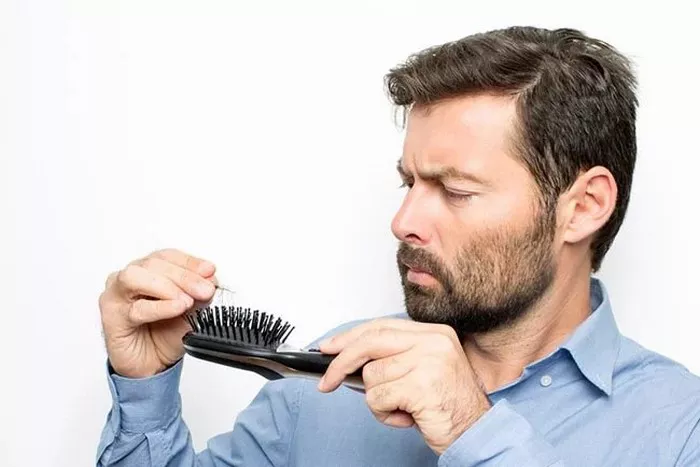Hair is not just a style statement; it often reflects overall health and well-being. For many men, maintaining healthy hair growth is a priority, and the role of vitamins in this process cannot be overstated. In this article, we will delve into the intricacies of hair growth, explore the essential vitamins crucial for maintaining healthy hair in men, discuss their benefits, natural food sources, recommended daily intake, supplementation advice, and when it’s time to seek professional help for hair loss.
Overview of Hair Growth
Before delving into the role of vitamins in hair growth, it’s essential to understand how hair grows and the factors influencing its health. Hair growth occurs in three main stages: anagen (growth), catagen (transitional), and telogen (resting). Approximately 90% of the hair on the scalp is in the anagen phase, which lasts for several years. Factors such as genetics, age, hormones, nutrition, and overall health can influence hair growth and health. Deficiencies in certain vitamins and minerals can contribute to hair thinning and loss.
Essential Vitamins for Hair Growth in Men
Several vitamins play crucial roles in promoting healthy hair growth in men:
1. B Vitamins: B vitamins, including Biotin (B7), Niacin (B3), and Cobalamin (B12), are essential for maintaining healthy hair follicles and promoting cell turnover in the scalp.
2. Vitamin D: Vitamin D helps in the formation of new hair follicles and is crucial for maintaining the health of existing follicles.
3. Vitamin E: Vitamin E is an antioxidant that helps improve scalp circulation, promoting hair growth.
4. Zinc: Zinc plays a vital role in hair tissue growth and repair, as well as the maintenance of oil-secreting glands on the scalp.
5. Iron: Iron deficiency can lead to hair loss, making it essential for maintaining healthy hair growth.
Benefits of Each Vitamin
Each of these vitamins offers unique benefits for promoting hair health:
B Vitamins: Biotin improves the infrastructure of keratin, a key protein that makes up hair, while Niacin increases blood flow to the scalp, promoting hair growth. Cobalamin aids in the production of red blood cells, which carry oxygen and nutrients to the scalp and hair follicles.
Vitamin D: Adequate levels of Vitamin D help create new hair follicles, which are necessary for healthy hair growth.
Vitamin E: As an antioxidant, Vitamin E helps reduce oxidative stress on the scalp, promoting healthy hair growth.
Zinc: Zinc plays a crucial role in DNA and RNA production, necessary for the normal division of hair follicle cells, promoting healthy growth.
Iron: Iron deficiency can lead to anemia, a condition that disrupts nutrient supply to hair follicles, resulting in hair loss. Adequate iron intake ensures optimal hair growth.
Food Sources
Incorporating foods rich in these vitamins into your diet can help promote healthy hair growth:
B Vitamins: Sources include whole grains, eggs, nuts, seeds, and leafy green vegetables.
Vitamin D: Fatty fish like salmon, fortified dairy products, and sunlight exposure are excellent sources of Vitamin D.
Vitamin E: Nuts, seeds, spinach, and avocados are rich sources of Vitamin E.
Zinc: Oysters, beef, chicken, nuts, seeds, and whole grains are good dietary sources of zinc.
Iron: Red meat, poultry, fish, lentils, spinach, and fortified cereals are excellent sources of iron.
Recommended Daily Intake
The recommended daily intake of these vitamins and minerals varies depending on age, gender, and overall health status. Generally, adult men should aim for the following:
- Biotin: 30-100 mcg/day
- Niacin: 16-35 mg/day
- Vitamin B12: 2.4 mcg/day
- Vitamin D: 600-800 IU/day
- Vitamin E: 15 mg/day
- Zinc: 11 mg/day
- Iron: 8 mg/day
Supplementation Advice
While obtaining essential vitamins and minerals through a balanced diet is ideal, supplementation may be necessary for individuals with deficiencies or those unable to meet their nutritional needs through diet alone. When considering supplementation:
- Choose reputable brands that undergo third-party testing for quality and purity.
- Consult with a healthcare provider before starting any new supplement regimen, as excessive intake of certain vitamins and minerals can have adverse effects.
When to See a Doctor
While some hair loss is normal, certain signs may indicate the need to consult a healthcare professional:
- Sudden or excessive hair loss
- Bald patches or thinning hair
- Itchy or painful scalp
- Changes in hair texture or color
A healthcare provider can help diagnose underlying causes of hair loss and recommend appropriate treatment options.
In conclusion, maintaining healthy hair growth requires a balanced diet rich in essential vitamins and minerals. By understanding the role of these nutrients in hair health, incorporating them into your diet, and seeking professional guidance when needed, men can promote optimal hair growth and overall well-being.


